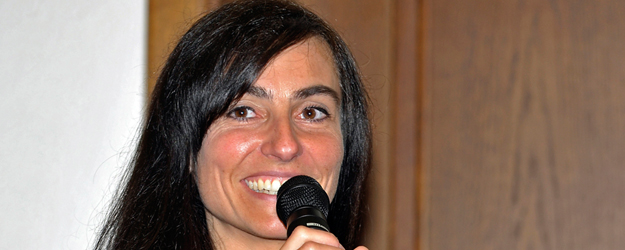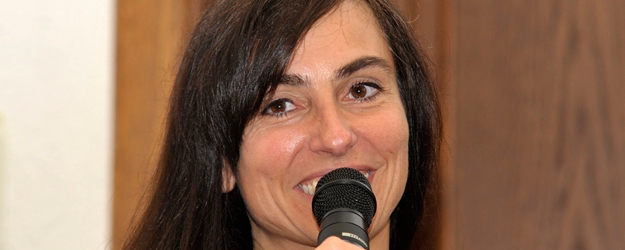7 May 2012
To German TV viewers, she is better known as "Super Nanny". Katia Saalfrank got great ratings but also garnered a lot of criticism. Before commencing her TV career, she studied education at Johannes Gutenberg University Mainz (JGU). It was not easy for the mother of four children; she always had to work hard to combine looking after a family with her university course. At the invitation of the Office of Gender Affairs and Equal Opportunity, this graduate of JGU came to Mainz to speak about how she managed it.
"I think university is the best time to have children," says Katia Saalfrank. The audience in the Atrium maximum at Johannes Gutenberg University Mainz is primarily made up of women. Some have even brought their children along to the event – one of the students present claims that her babysitter has canceled. So the statement of the guest at the podium seems to hit a nerve with those in the auditorium.
"We decided that we wanted to do something high profile that would draw attention to the problems of combining family and university studies," states Stefanie Meyer, Gender Affairs Representative of JGU's Office of Gender Affairs and Equal Opportunity. "And we wanted to get somebody one wouldn't expect from the Office of Gender Affairs." So they invited Katia Saalfrank so that she could tell the audience how to combine university, career, and family. It was also clear that the focus would also be on Saalfrank's time as "Super Nanny", even if this was not specifically on the agenda.
Four sons and a degree
"I'm somewhat overwhelmed at the moment," Saalfrank says at the start. "There is so much coming back to me and I haven't been here for a while. I can see some familiar faces." The audience includes not only her parents but also one of her former professors. "Right now I'm feeling a bit … emotional."
Saalfrank, who hails from Bad Kreuznach, studied education in Mainz from 1995 to 2000. She got her Abitur at a Wiesbaden school. Her first son was born in the period between her written and oral examinations. "People found me baffling. 'She's had a child before leaving school – she'll probably have the next while at university,' they said. When my third child arrived, they shook their heads and criticized me, sometimes directly to my face," explains the 40-year-old. And then she gave birth to a fourth son.
But she claims never to have brought her children with her to university. The professor in the audience contradicts this. Saalfrank continues: "Oh, perhaps I did. Did I also breastfeed? I did? During class?" Such interruptions do not distract her, they actually seem to have the opposite effect and Saalfrank appears to enjoy them.
Impossible without a husband
Her husband plays an important role in Saalfrank's account. "I could never have done it alone. He was also at university at the time and we divided the work. We made arrangements that we still stick to today." However, it was still stressful. "I have the impression that it took ten years before I got a decent night's sleep."
In 2000, the family moved to Berlin, where Saalfrank trained as a music therapist. It came to her attention that pseudo-reality shows using actors to play out psychological conflicts between individuals in front of a presenter were becoming increasingly popular with private German TV stations. "I thought: If they ever do anything like that about families, I will be livid if they don't do it right." She was already working in family counseling. Then she began to toy with the idea of what the series should look like.
TV station seeks child therapist
A few years later she came across a classified ad: "Major TV station is looking for child therapist for TV project." Saalfrank called them, intending to pitch her concept but the station, RTL, merely wanted a host to stand in front of the camera. "I hung up."
"You're nuts. You have been nattering on about this kind of opportunity for years. Now get over there," her husband commanded. She went, introduced herself, and got the job. "I cried an entire weekend because I was so excited." Then she found out more about the project. "I was actually pretty shocked when I found out what the "Super Nanny" concept was." She worked at RTL for seven years.
Doing something for children
"I think that I did it for so long because it enabled me to do so much." Saalfrank defends the show's format even though she now wants nothing more to do with it. "If you really want to do something for children, then television is a good medium." But she tends to speak in generalizations when countering criticism of the show. "I personally have never been afraid of criticism. Criticism has been important in many areas." She understands people who claim that it's not appropriate to present families and children in such a light. "That's one way of looking at it." However, this is a view she does not share.
"Personally, I would quite like to do another show but I don't just want to appear on TV, I would like to use TV to deliver a message." At present, she is using many other media to get her views across. She is currently on tour with her stage presentation concept "Nein Mama!" and she also writes op-eds and books. But her main job is still her own family counseling and supervision practice.
Critics outside the auditorium
"You can't plan for everything," she tells the women in the audience. "I never went down the path of saying: 'I want this and that'. To want something is one thing, but you shouldn't try to make long-term plans. Whatever – you should always try to remain true to yourself."
Saalfrank has given us the encouragement we need – this was the general impression the audience in the Atrium maximum came away with. But outside the auditorium, other women were distributing flyers criticizing the former "Super Nanny" and her television show. "This show humiliated children over years," one of the flyers claims. And it is true that the Commission for the Protection of Minors in the Media (KJM) imposed a EUR 30,000 fine because the show violated legislation intended to protect human dignity. "Is this an alumna we should be proud of?" was the title of one of the flyers. On this day, this question elicited contrary responses.



